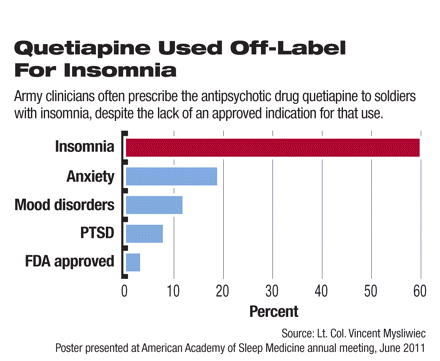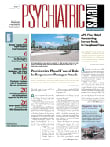Quetiapine is often prescribed off-label for insomnia, but patients are not properly monitored afterward despite the drug's well-known metabolic and cardiac side effects, said U.S. Army Lt. Col. Vincent Mysliwiec in a poster presented at the meeting of the American Academy of Sleep Medicine in June.
Mysliwiec is chief of pulmonary critical care and sleep medicine at Madigan Army Healthcare System in Tacoma, Wash.
"I noticed that as the wars in Iraq and Afghanistan progressed, more and more soldiers were coming into our clinic for insomnia evaluation rather than for obstructive sleep apnea," he said in a later interview with Psychiatric News.
Department of Defense figures show that in 2001-2002, soldiers were diagnosed with insomnia at a rate of 20 to 30 per 10,000. By 2009, the rate had soared to 226 per 10,000.
Many of these soldiers were treated with the antipsychotic drug quetiapine.
Quetiapine (Seroquel) does have some slight sedative properties. The drug has been used in some psychiatric patients to decrease agitation that disrupts sleep, but is hardly a first choice for sleep problems in nonpsychotic patients, Mysliwiec said.
"In my opinion, it was chosen as an alternative to benzodiazepines and to nonbenzodiazepines like zolpidem [Ambien] or eszopiclone [Lunesta] out of concern that benzodiazepines were potentially addictive and the other drugs [to treat insomnia] were associated with sleepwalking," he said.
Only small, short-term clinical trials have been carried out on quetiapine's value in treating insomnia, and they generally showed little change in a patient's sleep time or sleep quality linked to the drug.
Mysliwiec and colleagues at Madigan performed a retrospective chart study of 692 patients who had received quetiapine; patients had a mean age of 27.
Insomnia was the most common indication for quetiapine prescription (57 percent), with anxiety a distant second (20 percent). Only 9.4 percent received the drug for an FDA-approved indication (schizophrenia, bipolar disorder, and as a treatment adjunct in major depression).
On average, soldiers prescribed quetiapine gained 6.3 pounds each. Significant weight gain could impair a soldier's ability to perform his or her duties or even lead to discharge from the service, said Mysliwiec.
About 61 percent (388) of the soldiers taking quetiapine had glucose checks within six months of starting the drug. Glucose levels rose slightly, but no cases of diabetes were found.
Only 126 of the 692 patients (18 percent) received EKGs within six months of their quetiapine prescription. Mysliwiec and colleagues found 11 cases of QTc prolongation, 10 of which they attributed to quetiapine. All of those cases resolved when the medication was stopped.
"Our study shows that while this medication can help with sleep initially, it is not the best frontline therapy for insomnia," he said.
He would like to limit off-label use of quetiapine for insomnia. When it is prescribed, clinicians should adhere to monitoring protocols and watch patients closely for weight gain, glucose levels, and QTc prolongation, he said.
Clinicians should also use more quantifiable tools to diagnose insomnia and then rely more on counseling and cognitive-behavioral therapy for treating sleep problems, which might lessen reliance on the antipsychotic, he said.

